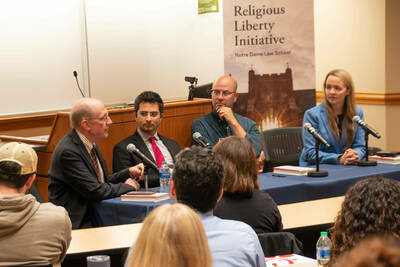Thomas Berg explores how religious liberty can reduce polarization in book talk hosted by ND Law’s Religious Liberty Initiative

In Religious Liberty in a Polarized Age, author Thomas Berg shows us how reaffirming religious freedom cultivates the good of individuals and society. In a book talk hosted by Notre Dame Law School’s Religious Liberty Initiative on September 7, Berg spoke about the importance of religious liberty and how it can reduce polarization. The second half of the event included a discussion with Notre Dame Law School professors Stephanie Barclay, Rick Garnett, and Sherif Girgis.
After explaining the features of polarization and the societal benefits of diverse religious practices, Berg offered practical counsel on balancing religious freedom against other essential values.
“We must renew our commitment to religious freedom for all, and that assertion has three parts,” Berg said. First, he asserted the importance of people’s ability to live consistently with their religious beliefs and identity. Second, he argued that strong religious freedom must extend equally to all faiths. Lastly, Berg stated that for religious freedom to be credible, there must be boundaries on it set by the important rights of other individuals and the interests of society.
“Religious freedom can play its historic role of countering cycles of suffering, fear, and resentment,” he said. “Today, I argue that religious liberty can ameliorate cycles of violence. A shared commitment to religious liberty obviously will not end polarization. But, it can help keep polarization from spiraling out of control if the commitment is strong, treats all faiths equally, and remains mindful of other interests.”
Religious liberty is currently among the key issues on which many Americans are polarized politically and culturally. As Berg mentions in his book, religious liberty disputes intensify divides over pressing issues, including LGBTQIA+ rights, national security, and immigration. Berg contends that religious liberty should do the opposite, asserting that it is “part of the cure for our political division.”
Berg pointed out that one of the key historic purposes of religious liberty, still relevant today, is to calm polarization — and the fear and resentment that cause it — by assuring people that they all have substantial freedom to live according to their deepest beliefs and identities. Religious freedom was established to “halt cycles of violence” that people experienced for living according to their deepest beliefs. As religious liberty provides security against such threats, it therefore helps people of fundamentally differing views to coexist.
Jared Huber, a third-year student at Notre Dame Law School and student fellow in Notre Dame Law School’s Religious Liberty Clinic, found Berg’s take on religious liberty enlightening and powerful: “Professor Berg’s proposal that one of the potential solutions to the increased polarization surrounding religious liberty is more religious liberty is insightful, provided religious liberty is expanded to all and not just allies,” said Huber. “Religious liberty is a principle that cuts across ideological divides. Treating it that way may well help reduce those increasing divides.”
Berg also engaged in conversation with Notre Dame Law School professors Barclay, Garnett, and Girgis. They spoke in depth about limits and other interests, which Berg focuses on in the third section of his book.
“Religious freedom has to be strong, but it also has to be limited,” Berg said. “We ought to enact nondiscrimination laws where they don’t exist, with significant exemptions protecting religious believers and organizations.”
In his book, Berg traces multiple parallels between two somewhat unlikely groups, same-sex couples and religious conservatives, giving reasons to protect both groups. “The protection of religious liberty must take into account other important interests, too,” Berg added.
Hadiah Mabry, a second-year student at Notre Dame Law School and student fellow in the Religious Liberty Clinic, also found his talk insightful and optimistic. She said, “Professor Berg has published many leading pieces of religious liberty scholarship, but perhaps none so timely as his new book, Religious Liberty in a Polarized Age. I am grateful for the opportunity to hear from Professor Berg firsthand about the current state of American affairs, and I especially appreciated his work to craft a path forward for individuals on all sides of the political spectrum.”
More information on Religious Liberty in a Polarized Age can be found here.
About the Notre Dame Law School Religious Liberty Initiative
Established in 2020, the Notre Dame Law School Religious Liberty Initiative promotes and defends religious freedom for all people through advocacy, formation, and thought-leadership. The initiative protects the freedom of individuals to hold religious beliefs as well as their right to exercise and express those beliefs and to live according to them.
The Religious Liberty Initiative has represented individuals and organizations from an array of faith traditions to defend the right to religious worship, to preserve sacred lands from destruction, to promote the freedom to select religious ministers, and to prevent discrimination against religious schools and families.
Learn more about the Religious Liberty Initiative at religiousliberty.nd.edu.
Originally published by at religiousliberty.nd.edu on September 14, 2023.